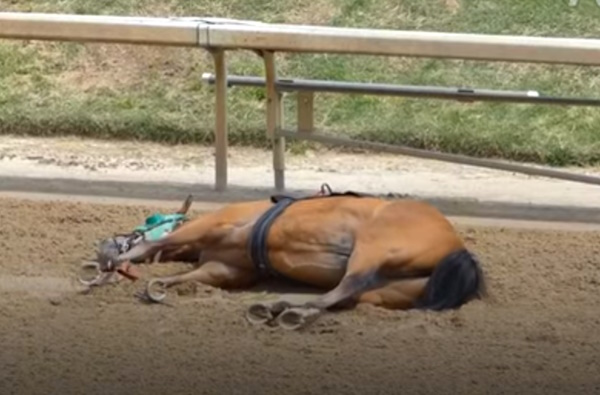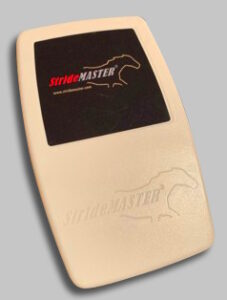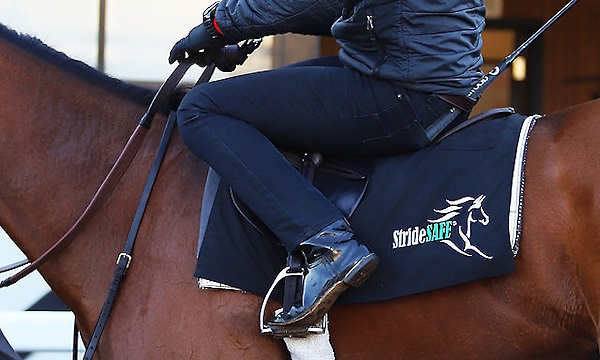After Being Fitted With Cell Phones, Horses at Churchill Downs Began to Die During Races
After Being Fitted With Cell Phones, Horses at Churchill Downs Began to Die During Races

Racehorses at Churchhill Downs
by Arthur Firstenberg, Cellular Phone Taskforce
June 8, 2023
Racehorses are among the most finely tuned, exquisitely sensitive creatures on earth. So what happens when you give them all cell phones to wear during a race? They start dropping like… well, horses.
That is exactly what started happening this spring at Churchill Downs in Louisville, home of the world-famous Kentucky Derby. Churchill Downs hosts three “meets” every year during which there are horse races four to five days a week — a spring meet lasting all of May and June; a September meet; and a fall meet throughout November. The spring meet this year at the Downs began on April 29 and was to continue until July 3. And beginning on April 29, and in every race on every day thereafter, every horse was fitted with a device they had never worn before. It is a wireless device, shaped like an iPhone, that fits into the cloth underneath the saddle on the horse’s back. Horses also began wearing these devices this spring during morning workouts.
 This STRIDESafe device monitors the horse’s movements 2,400 times per second throughout the race, sending 2,400 pulses of radio frequency (RF) radiation every second through the body of the horse. It also contains a GPS component that communicates with global positioning satellites. It also communicates with the RFID chip implanted in the left side of every horse’s neck, ensuring that the chip also emits radiation throughout the race. And because every racehorse wears horseshoes made of aluminum, which is one of the best conductors, the frequencies that are conducted from both the STRIDESafe device and the RFID chip throughout the horse’s body are absorbed and reradiated by its four shoes. Each horse, then, carries not one but six continuously radiating antennas throughout each race at Churchill Downs. So with 14 horses normally competing in each race, there are 84 antennas among animals in close proximity to one another running around the track.
This STRIDESafe device monitors the horse’s movements 2,400 times per second throughout the race, sending 2,400 pulses of radio frequency (RF) radiation every second through the body of the horse. It also contains a GPS component that communicates with global positioning satellites. It also communicates with the RFID chip implanted in the left side of every horse’s neck, ensuring that the chip also emits radiation throughout the race. And because every racehorse wears horseshoes made of aluminum, which is one of the best conductors, the frequencies that are conducted from both the STRIDESafe device and the RFID chip throughout the horse’s body are absorbed and reradiated by its four shoes. Each horse, then, carries not one but six continuously radiating antennas throughout each race at Churchill Downs. So with 14 horses normally competing in each race, there are 84 antennas among animals in close proximity to one another running around the track.

And on April 29, 2023, horses racing at Churchill Downs began to die during races or suffer such severe injuries during races that they were euthanized. So many horses have died this spring that on June 2 it was announced that the spring meet at the Downs would be suspended as of June 10. Officials at Churchill Downs are panicked because horses racing there have died in much larger numbers this spring than ever before. In 2022, nationwide, about 1.25 deaths occurred for every 1,000 horses starting at the gate. But since April 29, 2023, 12 deaths have occurred among just 1,600 starts at Churchill Downs, a sudden and unprecedented 8-fold increase in racehorse mortality.
Officials have carefully inspected the track and every part of the racing grounds and have found no change in any part of it from previous meets, and no reason for horses to be more prone to injury or collapse. But they have the same blind spot as the rest of society: they treat wireless devices, and the radiation they emit, as if they do not exist.
The horse named Parents Pride simply collapsed and died for no apparent reason during a race on April 29. No drugs were found in her system, and no poisons. She was running normally before the race. No abnormalities were found in her heart, brain or lungs.
Code of Kings “flipped” and broke his neck in the paddock just prior to a race and was euthanized, also on April 29. The paddock, also called the parade ring, is where horses are paraded before a race so the racegoers can get a good look at them.
Take Charge Briana suffered catastrophic damage to her right foreleg during a race on May 2 and was euthanized.
Chasing Artie completed his race on May 2 and then collapsed and died on his way to the unsaddling area, for no apparent reason.
Chloe’s Dream suffered a “catastrophic injury” to his right knee during a race on Derby Day, May 6, and was euthanized.
Freezing Point fractured his left forelimb during a race on Derby Day, May 6, and was euthanized. His jockey said that he was not bumped during the race and that the track was in good condition.
Bosque Redondo finished his race on May 13 but was taken away in a horse ambulance and was euthanized due to unspecified injuries.
Rio Moon was at the finish line of a race on May 14 when he suffered a “catastrophic injury” to his left foreleg and then was euthanized.
Swanson Lake finished his race on May 20 but was immediately taken to a veterinarian where he was euthanized because of a “significant injury” to his left hind leg.
Lost in Limbo, the horse pictured at the top of this newsletter, was removed from the track near the finish of a race on May 26. He had crashed nose-first on the track and lay heaving in the dirt. He was so jittery even before the race that he threw his jockey before it started and bolted. After the race a veterinarian found a “significant injury” to his left front leg and he was euthanized.
Kimberley Dream ruptured a ligament in her left front leg during a race on May 27 and was euthanized.
And two days before the spring meet began, while training on the racetrack on April 27, Wild on Ice broke his left hind leg and was euthanized.
We have known for decades that horses’ lives are shattered by radio waves. Hearings were held in Christchurch, New Zealand, and racehorse trainer Penny Hargreaves spoke out in an interview published in 1998. An FM radio tower in Ouruhia had had such devastating effects on her 90 horses that she was forced to relocate them to a different part of Canterbury. All her horses were affected, some more than others, and two died.
“They were very nervous and jumpy,” she said. “They all seemed to have sore feet. Horses who had travelled by trailer for years were losing balance while travelling. We have several hot spots around our yard where the horses become very volatile and hurt themselves and us.
“Our very valuable colt had serious health problems and walked as if his feet hurt. He could not bear to be shod. We had many vets look at him to try and solve his problems, but without any satisfactory answers. We finally turned him out in a paddock which has a large hay barn and trees between him and the tower. Within a month he had no problems at all. Back in his old yard, the problem returned.
“The blacksmith gave evidence at our hearing on the effect of the radio waves on our horses’ feet. The aluminum conducts electricity and their feet had changed shape, had huge cracks where the nails went and were very sensitive inside.
“We had weekly problems with infections we have never had before, our vet bills were horrendous.”
Nervous and jumpy racehorses with sore feet and lack of coordination. Exactly what has been happening at Churchill Downs during the spring meet this year.
When I learned what was happening at Churchill Downs this spring I sent an email to Dr. Jennifer Durenberger, suggesting to her that the STRIDESafe devices, which have been deployed at Churchill Downs for the safety of the horses, are instead killing them. She has not responded. Dr. Durenberger, a veterinarian, is the Director of Equine Safety & Welfare at the Horseracing Integrity and Safety Authority (HISA). She has been leading a review of the records of the horses that died.
If you are a veterinarian or have experience with horses and would like to help, please send me an email to arthur@cellphonetaskforce.org. This is an opportunity, if we can get Churchill Downs, HISA, and the owners of the racehorses that run in the Kentucky Derby to acknowledge what is happening and get rid of these new wireless devices — an opportunity to educate the rest of the world as well and catalyze a change of direction for us all.
Arthur Firstenberg
Author, The Invisible Rainbow: A History of Electricity and Life
Administrator, International Appeal to Stop 5G on Earth and in Space
Caretaker, ECHOEarth (End Cellphones Here On Earth)
Connect with Arthur Firstenberg
Cover image credit: Candiix